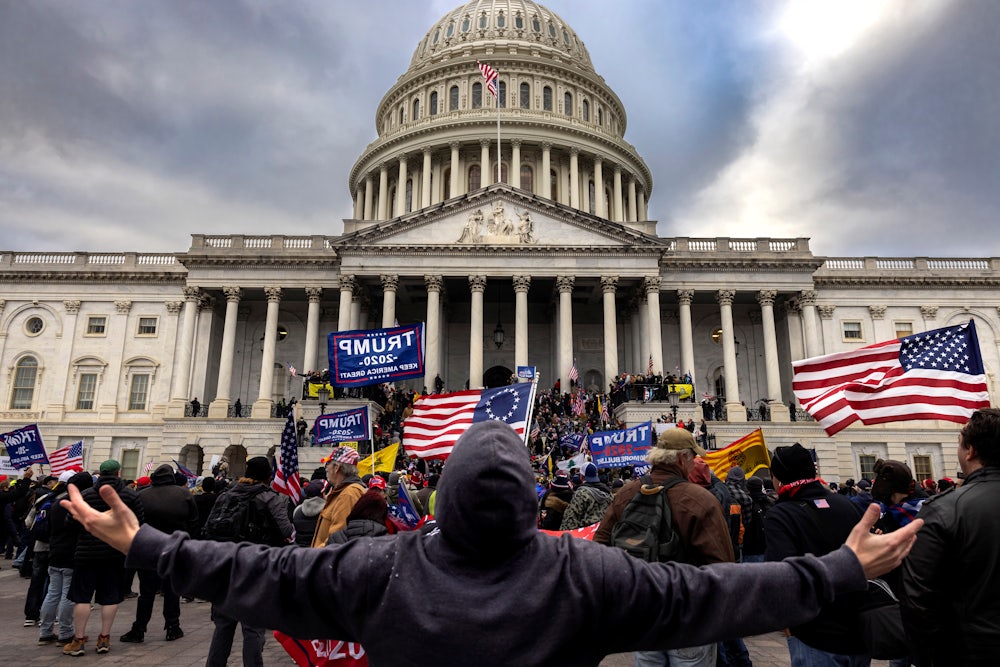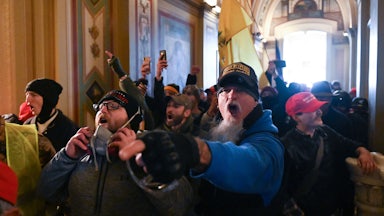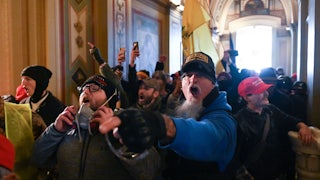When Japan attacked Pearl Harbor, there was a commission. When an assassin killed John F. Kennedy, there was a commission. Each time a Space Shuttle exploded, there was a commission. The U.S. government has assembled commissions to study the causes of the Great Depression, the September 11 attacks, and all sorts of crises large and small throughout its history.
But Republican lawmakers don’t want a commission to look into what happened on January 6. A riot incited by former President Donald Trump briefly seized the U.S. Capitol, interrupted the counting of electoral votes for President Joe Biden, and endangered the vice president and most of Congress. It was the first successful capture of the Capitol building since British forces burned down Washington in 1814, as well as the first time that the peaceful transfer of power from one president to the next had been disrupted in American history. The GOP wants to move past it.
Opposition to creating a January 6 commission came on Tuesday from House Minority Leader Kevin McCarthy, who cited partisan politics and complained that the proposed body wouldn’t look into unrelated incidents of civil unrest. He was joined on Wednesday by Senate Minority Leader Mitch McConnell, who claimed the effort was unnecessary and duplicative. Their efforts were cheered on by Trump himself.
“Republicans in the House and Senate should not approve the Democrat trap of the January 6 Commission,” the former president declared on his personal blog on Tuesday. “It is just more partisan unfairness and unless the murders, riots, and fire bombings in Portland, Minneapolis, Seattle, Chicago, and New York are also going to be studied, this discussion should be ended immediately. Republicans must get much tougher and much smarter, and stop being used by the Radical Left. Hopefully, Mitch McConnell and Kevin McCarthy are listening!”
There are no honest reasons to oppose a January 6 commission. Americans deserve full and comprehensive answers about what Biden correctly described as the worst attack on American democracy since the Civil War. Congress is fully justified in seeking answers about why the Capitol wasn’t properly secured before the riot, why reinforcements took so long to arrive, and what can be done to prevent similar episodes in the future.
McConnell and McCarthy both suggested that they opposed the bill because it would give too much power to Democrats. In his statement, McConnell claimed that Democrats were “continuing to insist on various other features under the hood that are designed to centralize control over the commission’s process and its conclusions in Democrats’ hands.” He pointed to no specific instances where this was the case. Nor did McCarthy, who still alluded to “political misdirections that have marred this process” without providing any details to back up his assertion.
The bill itself, H.R. 3233, is largely modeled on the one that established the 9/11 Commission two decades ago. Under the current proposal, Speaker Nancy Pelosi and Senate Majority Leader Chuck Schumer would select five of the committee’s 10 members, while McConnell and McCarthy would name the other five members. The commission would have the power to issue subpoenas. A subpoena could only be issued, however, if the Democratic-appointed chair and the Republican-appointed chair agree on it, or if a majority of members vote in favor of it. GOP fears that the commission would influence next year’s midterms are also unfounded: The committee’s report would be due for release by December 31.
The real problem for Republican leaders is that they already know what some of the commission’s findings will be. They know, for instance, that Trump bears responsibility for the violence that swept through the Capitol on January 6. McCarthy knows this because he personally called Trump during the riot and begged him to call off his supporters. McConnell also knows that Trump is responsible: He stated as much multiple times on the Senate floor, both on the day of the attack and also shortly after the Senate acquitted Trump in a second impeachment trial in February.
At the same time, this generation of Republican leaders is all too aware of the political damage that a high-profile inquiry can inflict. Some of them pushed years of Benghazi inquiries to pursue unfounded and conspiratorial claims in a bid to damage Hillary Clinton’s electoral chances in 2016. This is not my humble interpretation of events: McCarthy himself admitted it in a Fox News interview. “Everybody thought Hillary Clinton was unbeatable, right?” he told Sean Hannity in 2015. “But we put together a Benghazi special committee, a select committee. What are her numbers today? Her numbers are dropping. Why? Because she’s untrustable. But no one would have known any of that had happened, had we not fought.”
It stands to reason that an inquiry based in reality would carry even greater weight among voters. Since Trump remains the leader of the Republican Party, as well as its likely 2024 presidential nominee, neither McConnell nor McCarthy want to offend him or harm his chances. The two men have made peace with the fact that he incited a riot four months ago that endangered them and their colleagues. And in doing so, they have made it more likely that he will threaten American democracy again, even to the point of shedding blood. In their analysis, the pursuit of raw political power is more than worth that incalculable cost.
This is another grim sign for American democracy, shining among many other blinking warning lights. Though Biden won the 2020 election fairly and cleanly, state-level Republican officials have increasingly embraced lies and conspiracy theories about electoral fraud to cover for Trump’s defeat. In Washington, this willful amnesia now includes a cadre of conservative lawmakers who have either downplayed the events of January 6 or made an effort at revising the very recent history of the event, including one who dismissed it as a “normal tourist visit.” (Five people died.) The putsch failed, so it must not have happened. To underscore their commitment to the lie, Republicans who dissent from these lies are now pushed out of leadership roles. If the GOP retakes the House in 2022, it’s an open question whether they would vote to approve a Biden reelection in 2024.








